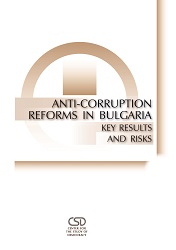Anti-Corruption Reforms in Bulgaria: Key Results and Risks
Anti-Corruption Reforms in Bulgaria: Key Results and Risks
Author(s): Author Not Specified
Subject(s): Politics / Political Sciences, Social Sciences, Economy, Law, Constitution, Jurisprudence, National Economy, Sociology, Applied Sociology, Criminology, Economic development, Socio-Economic Research
Published by: Център за изследване на демокрацията
Summary/Abstract: This is the eighth Corruption Assessment Report providing an overview of the state and dynamics of corruption in Bulgaria and Bulgarian anticorruption policy. It analyzes the main results and risks of the anticorruption process from the period immediately preceding Bulgaria’s accession to the EU through to the first months of EU membership. The report builds on regular monitoring of the spread of corruption, its trends, evaluations of the anti-corruption efforts and initiatives implemented by government institutions and by civil society, as well as a number of suggestions and recommendations on anti-corruption measures, including considerations related to the administration of EU’s structural funds. In addition to the main corruption indexes which have consistently displayed lower values throughout 2006 and early 2007, the report draws on authoritative international surveys to assess corruption levels in Bulgaria in comparison to EU member states. Furthermore, Bulgaria’s EU member status demands that national anti-corruption initiatives are implemented in close coordination with EU and international efforts in this area. Therefore, corruption would be most appropriately measured and assessed by a common EU benchmarking methodology as the most reliable yardstick for international comparisons.
Series: CSD Corruption-Monitoring
- Print-ISBN-13: 978-954-477-146-1
- Page Count: 116
- Publication Year: 2007
- Language: English
- eBook-PDF
- Table of Content
- Introduction

